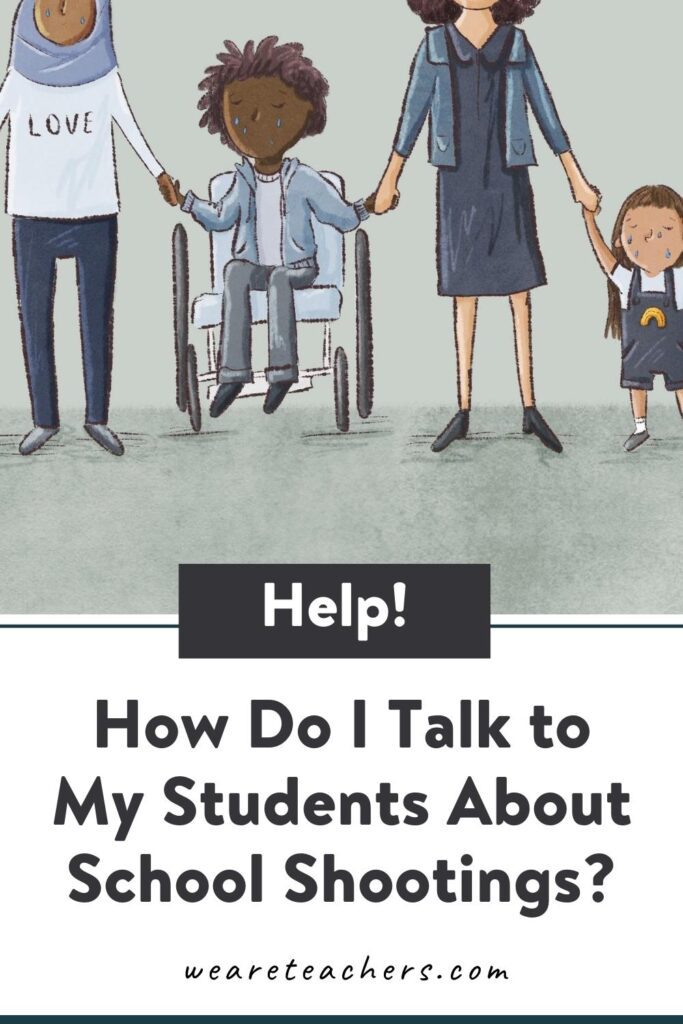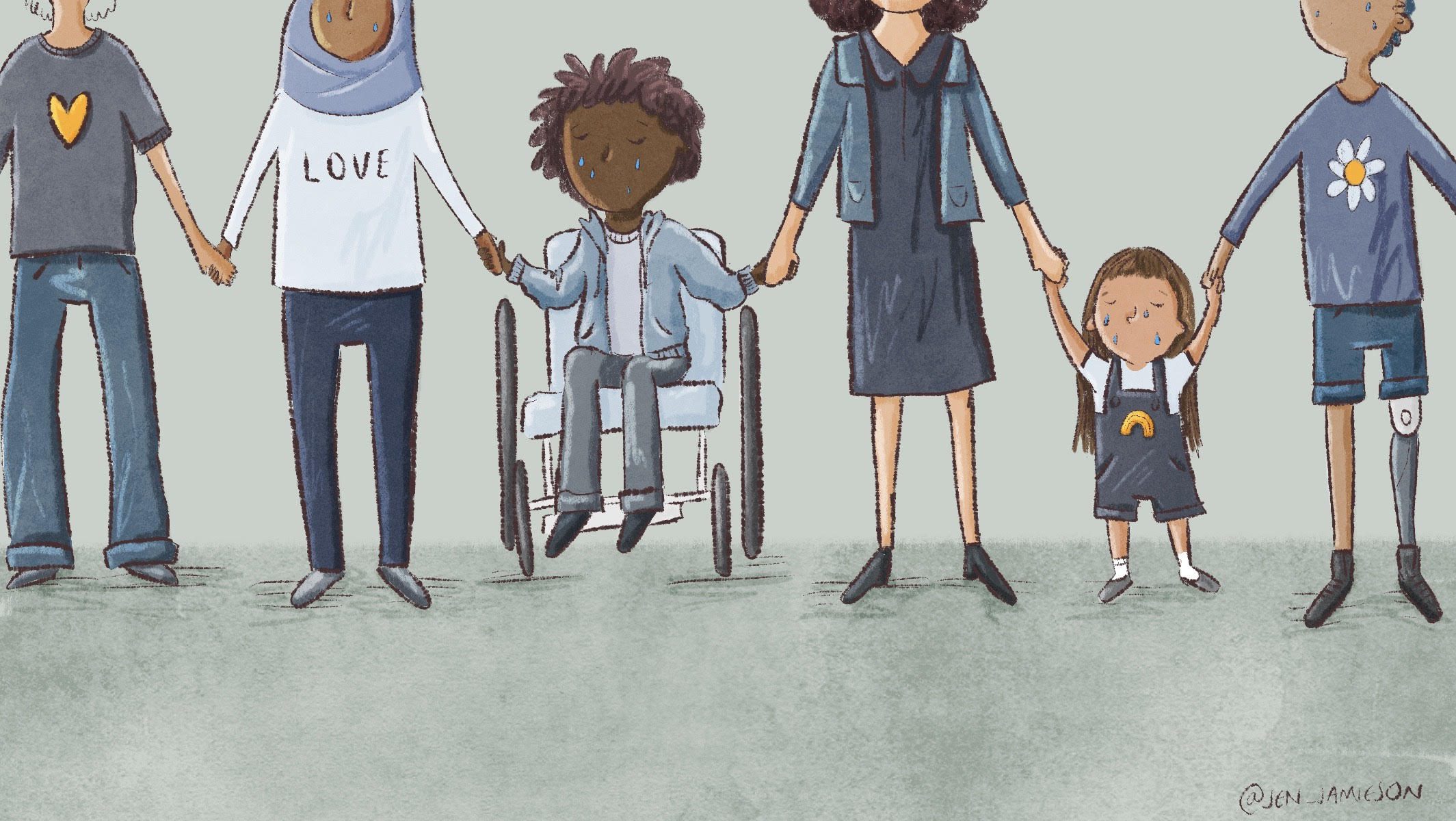Dear WeAreTeachers:
Every day, I hear my second grade students talking about what they see on the news. Often it’s about violence. Between the Buffalo supermarket shooting and the school shooting in Texas, I’m at a loss. They seem so disillusioned and almost numb to another mass shooting. I don’t feel super-confident facilitating hard conversations, so I usually jump right into teaching my content. Lately, I feel like I could do a better job of building relationships with my kids, and maybe engaging about current events is one way to do that. What advice do you have on talking about hard things? —Brokenhearted
Dear B.,
It’s just not supposed to be like this. During this past week, our country has suffered MORE major violent shootings. Educators are weary, kids are worthy of safe spaces, and so many of us feel disillusioned and heartbroken. With 27 school shootings taking place in 2022 in the United States alone, it’s hard to know how to manage our big feelings. From Buffalo’s supermarket shooting to the Texas school shooting, most educators are wondering what to do and say to the kids.
Often people say it’s best to not bring up these tragedies unless the kids bring it up first. However, I think it’s important to check in, especially since anxiety and fear can take over. Acknowledge the heartbreak with major compassion. Let kids know that they are not alone and that you are here to talk and listen. Then, try to follow school schedules as best as you can. The National Association of School Psychologists suggests that we provide a sense of routine and normalcy while also creating a safe space to talk about what they know about the tragedy and how they are feeling.
“High-profile acts of violence, particularly in schools, can confuse and frighten children who may feel in danger or worry that their friends or loved ones are at risk. They will look to adults for information and guidance on how to react. Parents and school personnel can help children feel safe by establishing a sense of normalcy and security and talking with them about their fears.”
Younger students may have bits and pieces of information and will need reassurance that teachers are working really hard to keep them safe. Helping the kids express a variety of feelings at once is important. We can be sad, we can be scared. Older students will most likely have strong opinions about these recent tragedies. LISTEN WELL. Encourage your students to share their understanding of what happened. Have the kids write down their ideas about what they think is causing these horrendous acts against humanity and how to make their school site and society a safer place. Be sure to share their ideas with the leadership team and follow up with leadership for a response to the students.
We all exhibit our distress in different ways so it’s important to be observant. As we work to regain emotional and physical safety again, it helps to remind the students that watching the same news clips over and over has a detrimental effect on their well-being. Repeated exposure to violent crimes makes worry and anxiety skyrocket. People are ready to move beyond gun control debates and want policy change that sends a message loud and clear that our kids deserve better. In fact, as divisive as our country is, a recent poll states that 84% of all U.S. voters support universal background checks. We can no longer continue to be in shock, then express thoughts and prayers without action. WE ABSOLUTELY MUST DO SOMETHING DIFFERENT. Our kids’ lives depend on it.
American Poet Amanda Gorman wrote this piece in response to the recent shooting:
Schools scared to death.
The truth is, one education under desks,
Stooped low from bullets;
That plunge when we ask
Where our children
Shall live
& how
& if
Dear WeAreTeachers:
It’s been a beautiful and rough year. I’m most proud of the connections I made with my fourth-grade students. We had community circle meetings daily and really built trust over time. The kids also showed a lot of progress, especially in writing. I worked mostly well with my grade-level team, but the lead teacher shut my ideas down pretty often. Also, when my principal visited, it was chaotic with the kids. He gave me feedback about classroom management, but discipline issues escalated and we had to suspend a student for fighting. My principal initiated a meeting with me, and I figured it was to talk about what grade to teach next year. I was surprised when he asked me to consider resigning. There was really no feedback. I’m feeling pretty down and like a crappy teacher. How do I stay motivated for the last few weeks of school?
—Down and Disillusioned
Dear D.A.D.,
You capture how life is full of moments of beauty and challenge at the same time. You are in the thick of it, so let yourself feel all the different emotions that are bubbling up. Hopefully, you have someone you trust and can talk to. This is a lot to carry on your own. Even though your year didn’t work out as you hoped, please remember the quality connections and progress you made with the kids. That’s a big deal! Those memories for you and your students will endure. Let author Maya Angelou’s words wash over you: “I’ve learned that people will forget what you said, people will forget what you did, but people will never forget how you made them feel.”
I think it’s important to speak up to your principal and communicate a desire for feedback. Your principal may not feel like they legally have to provide you with any feedback. In my view, it’s the professional thing to do. Leaders who care about the impact teachers have on students (even beyond their own campus) help teachers become more aware and reflective. As teachers, we give our students feedback to help them stretch and learn. Growth mindset messages are all over schools. This should apply to adults, too. Let your principal know that you would like to learn from this context and that their feedback can help.
Keep in mind that the end of the year is challenging for teachers. It’s especially hard with the lingering COVID context and all the distress that goes with it. Educators are tired. Really tired. Wrapping up a school year is hard under more normal circumstances but exponentially more difficult with your current reality of being asked to resign. Teachers have to dig deep for motivation at different times of the year and with the various confluence of circumstances that emerge. Motivation is such a personal thing. Finding the stick-with-it-ness is hard, but you can do it. Try to find moments in the day that are enjoyable and meaningful to you. Most of all, as you close out the year, show up for your students. They are worthy of your best.
Dear WeAreTeachers:
This was my first year teaching, and I was given our 10th-grade honors classes to teach. The prior teacher was known for being extremely rigorous to the point that our honors group’s grades would drop drastically. Now that we are finishing up, I’m starting to feel like I didn’t push my students hard enough. For example, I accommodated a lot of personal issues that were affecting their assignments. It’s making me question my ability as a teacher overall, and I just don’t know how to get past this fear. What are some next steps for me?—Fear of Being a Pushover
Dear F.O.B.A.P,
My guess is that most teachers remember their first year. The job is so dynamic and requires so much emotional, physical, mental, and spiritual capital. We remember our wavering confidence, the risks we took, the mistakes we made, the enthusiasm, the overwhelmingness, the relationships with the kids, the struggles with classroom management, and so much more. Congratulations on experiencing YOUR first year. What successes have you and your students experienced? I bet if you took 10 minutes to jot down some ideas, you might be able to breathe a little deeper.
Try to let go of a binary view of teaching as either being tough or a pushover. It sounds like you were flexible and supportive of your students. Kids aren’t motivated when they are overly frustrated and their spirits are crushed. You can be tough and kind. This is sometimes known as a “warm demander.” Warm demanders are teachers who, in the words of scholar Lisa Delpit, “expect a great deal of their students, convince them of their own brilliance, and help them to reach their potential in a disciplined and structured environment.”
Interestingly, there is some data saying that teachers who help learners make greater gains may not be perceived as likable, and yet they were effective. Angela Duckworth shares a bit of perspective on how being “beloved isn’t always best.” She says, “Don’t confuse popularity with proficiency. I still want my students to like me, and I think it’s possible for a demanding teacher to be supportive, too. But if I prioritize what students think of me in the moment, I may be sacrificing their long-term learning.”
As you transition into the summer, fill up your cup, find inspiration, reflect, be open, and then shift into a new year with the juxtaposition of having high expectations and varying levels of support. This combo is the sweet spot that cultivates a positive culture and deep learning.
Do you have a burning question? Email us at askweareteachers@weareteachers.com.
Dear WeAreTeachers:
I’m a parent and first-grade teacher. Juggling these different roles and responsibilities has been a challenge, to say the least. This year, I have missed quite a bit of school. I was out for 10 days with COVID. I also needed to take care of my two young kids when they were sick. We always hear people say “family first,” but when I do take care of my family and myself, I feel self-conscious that the parents will think I’m not prioritizing my work. At pickup time, a parent commented in front of many other families that she was surprised to see me here since I’ve missed so much school. “Oh, you decided to come to work!” She even complained to the principal and said that her child’s school experience has been negatively impacted because of my absences. How do you think I should handle this?
Want more advice columns? Visit our Ask WeAreTeachers hub.


